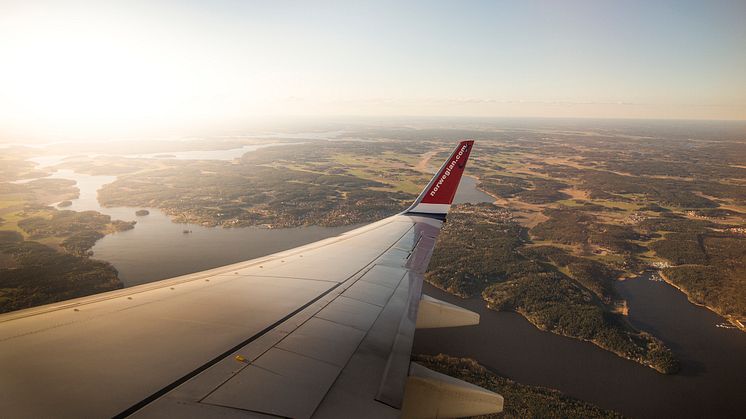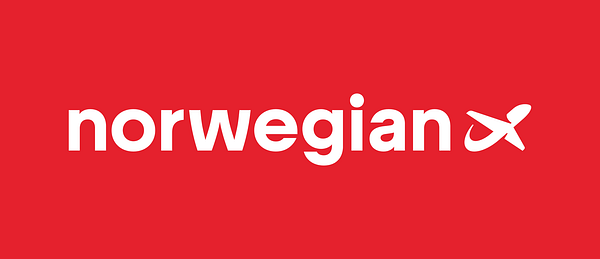
Press release -
Norwegian commits to reduce CO2 emissions by 45 percent by 2030
Today Norwegian has launched a new environmental sustainability strategy that will begin immediately and deliver several industry leading targets. Cutting CO2 emissions by 45 percent, remove all non-recyclable plastics and recycle all single-use plastics are key commitments in the new strategy. The goal is in line with the 1.5°C target set forth in the Paris Agreement.
Jacob Schram, CEO of Norwegian, said: “At Norwegian we take our responsibility towards the environment seriously, and that is why we must look to the future and implement a strategy that produces immediate and tangible benefits for the environment today. Norwegian will continue to instigate a positive change across the industry in this field that will benefit not only the environment but also our customers and our business. The low-cost business model is the sustainability model as it enables efficient energy and resource management.”
Will require 500 million litres sustainable aviation fuels
To limit global warming to 1.5°C, carbon emissions must be reduced by 45 percent by 2030 compared to 2010 levels, according to the International Panel on Climate Change (IPCC, 2018). We commit to improve the carbon efficiency of our operations and will reduce our carbon emissions by 45 percent per passenger kilometer (RPK) by 2030 - compared to 2010 levels. This will be achieved through both fleet renewal and sustainable aviation fuels.
The airline commits to utilising between 16 and 28 percent sustainable aviation fuels by the end of the decade, depending on the level of fleet renewal. The target amounts to up to 500 million litres sustainable aviation fuels by 2030.
To achieve this important goal, it is also crucial to get in place a regulatory framework that actively rewards carbon efficiency and increases both the production and use of sustainable aviation fuel.
Jacob Schram said: “We encourage producers to ramp up production of sustainable aviation fuels. Norwegian will be actively engaging with producers to kick start this vital contribution to the industry and take advantage of the emission savings that these fuels offer.”
Will remove all non-recyclable plastics
Initial elements of the sustainability strategy will also include a 100 percent reduction of non-recyclable plastics and 100 percent recycling of single-use plastics by 2023.
Anders Fagernæs, Norwegian Head of Environmental Sustainability, said: “More sustainable and smarter options are becoming a greater part of the considerations that customers make when choosing which airline to fly with. We will champion this attitude and become the customers sustainable choice by reducing and recycling plastic waste, promoting sustainable aviation fuel and continuing to fly one of the world’s youngest fleets to achieve a 45 percent reduction in CO2 emissions by 2030.”
A solid foundation
Norwegian is already one of the world’s leading fuel-efficient carriers due to its modern fuel-efficient aircraft. Norwegian was the first airline to sign the United Nations Framework Convention on Climate Change (UNFCCC) pledge, committing to become carbon neutral by 2050.
The airline was also voted the world’s most fuel-efficient airline on transatlantic routes in 2015 and 2018 by the International Council on Clean Transportation (ICCT) and since 2010 the airline has reduced its emissions by 28 percent.
For more information please see the attached presentation.
Topics
About Norwegian
The Norwegian story began over 27 years ago - we were founded in 1993 but only began operating as a low-cost carrier with bigger Boeing 737 aircraft in 2002. Norwegian expanded across the globe as the airline launched short-haul services across Europe and then entered the long-haul sector serving the US, Asia and South America. We operate a modern and fuel-efficient fleet consisting of Boeing 787 Dreamliners and Boeing 737s.
We were the first airline in the world to join the UN Climate Secretariat’s climate action-initiative in 2019, pledging to work systematically to become carbon neutral by 2050.
From being voted for six consecutive years as Europe’s Best Low Cost airline and for five consecutive years as the World’s Best Low Cost Long Haul Airline by Skytrax to winning Airline Program of the Year Europe & Africa for the fourth consecutive year at the 2020 Freddie Awards - In total Norwegian has won over 55 awards for our service, product and innovation in the industry since 2012.
Norwegian has become part of the fabric of Nordic culture and we take great pride in exporting our Nordic values across the world.


